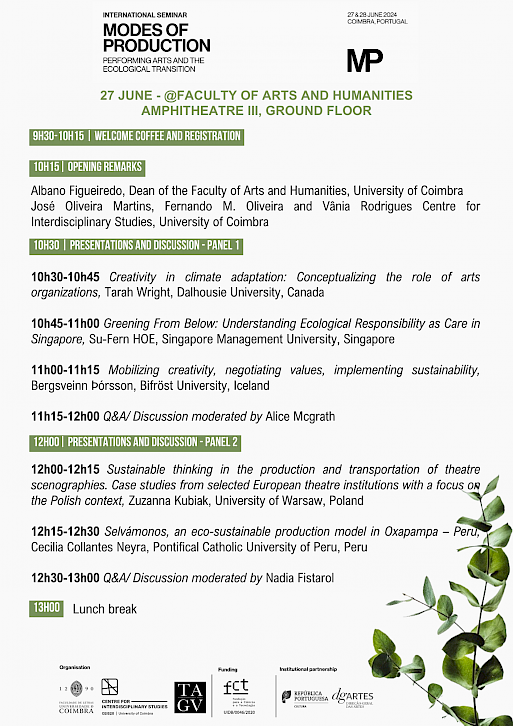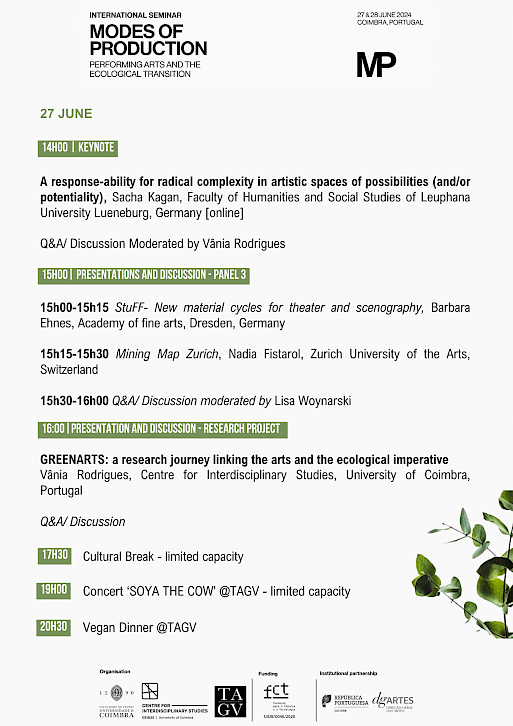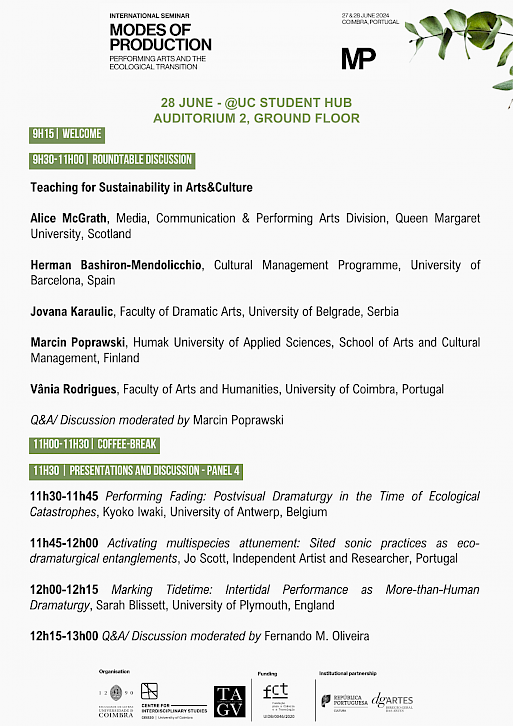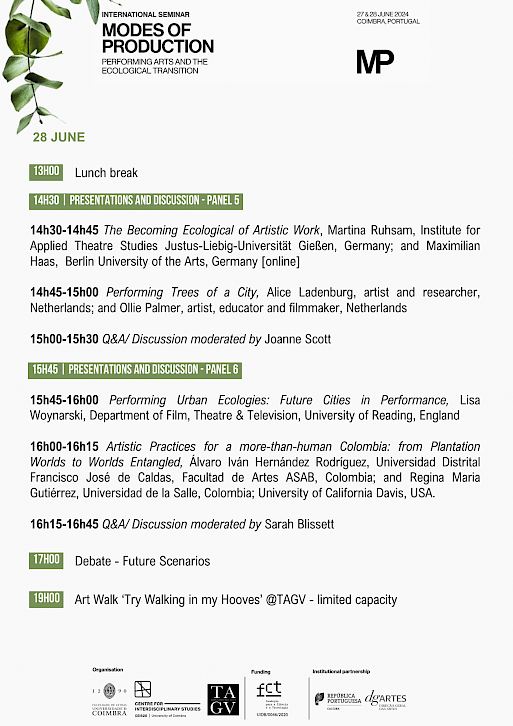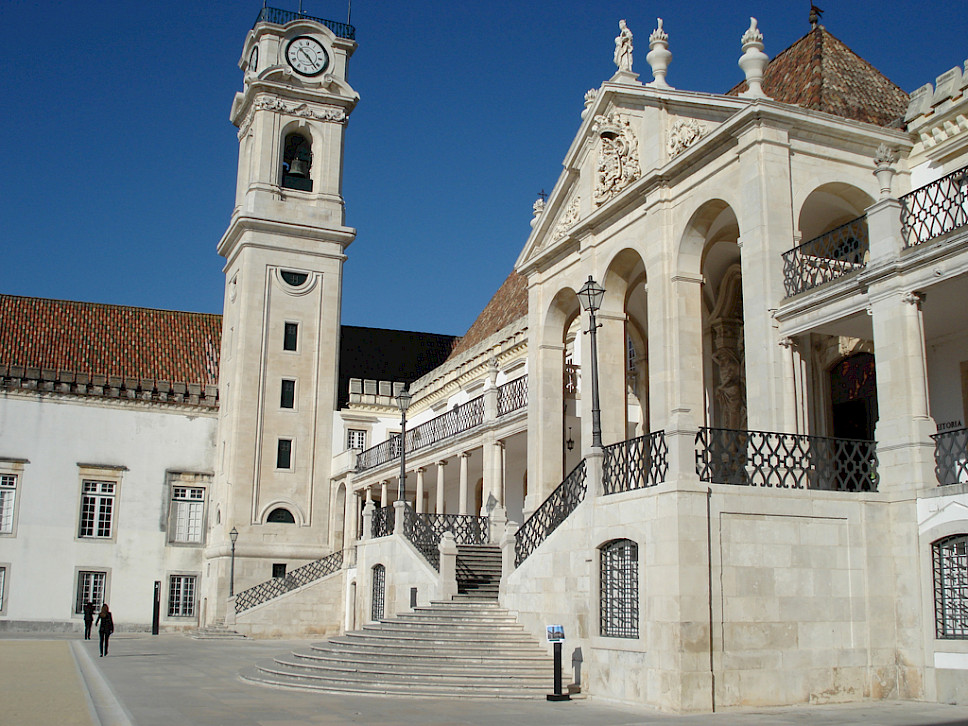Modes of Production: Performing Arts and the Ecological Transition
After an encouraging launch in the end of 2021, we are now organizing a second International Seminar, this time a face-to-face meeting in Coimbra: one and a half days with presentations, debates and performances. Modes of Production – Performing Arts and the Ecological Transition signals the culmination of the GREENARTS project and will thus present its main results and host a series of discussions fully dedicated to the critical junction between the arts, cultural policy, and the ecological emergency.
Modes of Production
I. Modes of Production – Performing Arts in Transition is a Research & Development platform that intercrosses the field of artistic studies with the hybrid field of arts management and creative production.
Based at the Centre for Interdisciplinary Studies of the University of Coimbra (CEIS20-UC), it is the result of a partnership with the Artistic Studies Programme at the Faculty of Arts and Humanities, the Post-Graduate Diploma in Cultural Management and Sustainability and the Teatro Académico de Gil Vicente (TAGV-UC). Its initiatives and studies are carried out in permanent and updated articulation with practitioners and institutions in the arts and cultural sector. It analyses the modes of production and management models of arts and cultural projects and organizations in the face of several contemporary transformations, namely those that are raised by the demands of fair practices and social and environmental sustainability. It hosts the scientific FCT-funded GREENARTS project, which pays attention to the implications of the ecological imperative upon the arts and culture.
After an encouraging launch in the end of 2021 – which resulted in an edited volume soon to be published by transcript - we are now organizing a second International Seminar, this time a face-to-face meeting in Coimbra: one and a half days with presentations, debates and performances. Modes of Production – Performing Arts and the Ecological Transition signals the culmination of the GREENARTS project and will thus present its main results and host a series of discussions fully dedicated to the critical junction between the arts, cultural policy, and the ecological emergency.
II. The sense of urgency around ecological perils is growing unmistakably in the culture and creative sectors, including in the performing arts. The burgeoning mobilisation of the fields of theatre, dance and performance materializes in a constantly expanding proliferation of manifestos, artistic and institutional projects, policy initiatives, publications, and practical tools. This effervescence is driven by the steadily alarming warnings from scientists and activists, but it is also, importantly, akin to the sector’s heightened self-awareness. Artists, producers, and arts managers are more and more self-conscious about the environmental footprint of their own activities and increasingly invested in attuning themselves with the planetary emergency and its resulting inequalities. Importantly, they are also acutely aware of the overarching political implications of the ‘green transition’, and vigilant of the contradictions that such transformations entail when associated with specific geographical and historical circumstances (Rodrigues, 2024). Indeed, ecological distress is already impacting artistic and curatorial decisions, as well as challenging production, touring and management models (Janssens & Fraioli 2022; VoC, 2023; Vries 2021). Modes of Production – Performing Arts and the Ecological Transition argues that the environmental emergency can rightly be seen as a major disorganiser of the modi operandi of the arts and culture field, insofar it questions the assumptions of cultural policies, the underpinnings of funding mechanisms, and the routines of creating, producing, managing, distributing, and experiencing art (Rodrigues, Oliveira and Ventura, 2024). At the same time, the widening demand for sustainability dramatically exposes the arts and culture’s overreliance on expansionist and productivist processes (Rodrigues, 2024) within a growth-oriented capitalist paradigm (Dragisevic Sesic, 2021).
While approaches from eco-dramaturgy, ecological theatre and eco-criticism have been consistently explored since at least the 1990s (Chaudhuri, 1994; Buell, 1999; Arons and May, 2012;) - either from pragmatic, thematic or aesthetic perspectives (Sermon, 2021) -, it is undeniable that only in this millennium, and most decidedly after the pandemic crisis -“a powerful revealer of our ecological condition” (Sermon, 2021:8) - have the arts been more systematically challenged to take on the role of raising awareness around the severity of the environmental crisis, making use of their storytelling capacity and of their ability to illuminate complex relationships between interdependent ecosystems (Skolczylas, 2021; Banerjee and Shreedhar, 2021). This is a crucial moment to question the performing arts’ willingness and capacity to take part in the great change in values inherent to ecological thinking, questioning anthropocentrism, redistributing agency, and establishing relationships with the more-than-human world. It is also an exciting time to look at the effects of the ecological challenge upon the artistic forms themselves: how are theatre, dance, or performance reinventing language and form to integrate an eco-responsibility? Could ‘multi-scalar aesthetics’ lead to a renewed ‘biological imagination’ and a ‘re-scaled’ relationship (Campos, 2022) between life and performance? Can ecological theatre resist being absorbed into ever more sophisticated forms of greenwashing?
Modes of Production – Performing Arts and the Ecological Transition will reflect and debate these issues, paying attention to formats, materials, processes, contexts and decisions.
Keynote Speaker
On 27 June, the author and researcher Sacha Kagan will present the talk "A response-ability for radical complexity in artistic spaces of possibilities (and/or potentiality)".
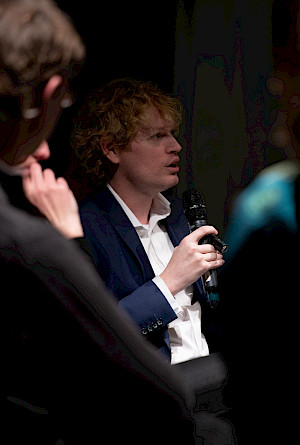
Ph: Detlev Hoffmann
PD Dr. Sacha Kagan is a social scientist and transdisciplinary cultural researcher, currently based in Germany at the universities of Hildesheim (as Principal Investigator of a DFG-funded research project on "Queering Jewish Cultural Heritage in Europe") and of Lueneburg (as a 'Privatdozent') where he worked as Research Associate (2005 to 2018). He previously coordinated the “Research Network: Sociology of the Arts” at the European Sociological Association (2015 to 2017) and the cultural network “Cultura21 International: Cultural Fieldworks for Sustainability” (2007 to 2016). He is a recipient of the "Basarab Nicolescu Transdisciplinary Science and Engineering Award" (2018), author of over 70 publications, director of three documentary films, and contributor to a dozen arts projects.
Key Dates
15 April – 6 June – Registration Open – Early Bird Fee
7 June – 19 June - Regular Registration - Regular Fee
20 June – 24 June – Late Registration – Late Fee
27 + 28 June – Seminar in Coimbra
Contact
For any questions or queries please contact modesofproduction@uc.pt
Scientific Committee
Vânia Rodrigues, CEIS20-University of Coimbra, Portugal
Fernando M. Oliveira, CEIS20-University of Coimbra, Portugal
Kitija Balcare, Institute of Literature, Folklore and Art of the University of Latvia
Mário Montenegro, Marionet and CEIS20-University of Coimbra, Portugal
Julia Schade, Ruhr-University Bochum, Germany
Herman Bashiron-Mendolicchio, Cultural Management Programme, University of Barcelona
Jovana Karaulic, Faculty of Dramatic Arts, University of the Arts Belgrade, Serbia
Jordi Baltá Portolés, Blanquerna – Universitat Ramon Llull, Barcelona
Marcin Poprawski, Humak University of Applied Sciences, Finland
Organising Committee
Vânia Rodrigues
Fernando Matos Oliveira
António Ventura
Useful Information
University Palace: Tower and Via Latina © UC, Cátia Marques
Accomodation:
Hotel Oslo (10% discount when mentioning the seminar):
Standard Room: 110€
Hotel Astoria (Special rate when mentioning CODE REF: CEIUC – Seminário 2024):
Single Room 75€
Double Room 80€
Casa de São Bento (special rate)
Standard Room: 85€
Superior Room: 90€
Ibn Arrik (special rate):
Standard room € 78
Superior room € 88
Suite € 110
Airports:
The airport closest to Coimbra is Aeroporto Francisco Sá Carneiro in Porto.
From there:
- Airport shuttle: straight from the airport to Coimbra.
- Subway+Train: there is a subway line at the airport, from it you can reach either of the two train stations: São Bento or Campanhã, both of which connect to Coimbra.
- Trains to Coimbra: timetables available at CP -Comboios de Portugal
- Subway+Bus: from the Airport take the subway to Campanhã station.
- Buses to Coimbra: timetables available at Rede Expressos.
Lisbon International Airport is around 200km away from Coimbra
From there:
- Airport shuttle: straight from the airport to Coimbra.
- Subway+Train: there is a subway line at the airport, from it you can reach either of the two train stations: Oriente or Santa Apolónia, both of which connect to Coimbra.
- Trains to Coimbra: timetables available at CP -Comboios de Portugal
- Subway + Bus: from the Airport take the subway to Sete Rios Station.
- Buses to Coimbra: timetables available at Rede Expressos.


